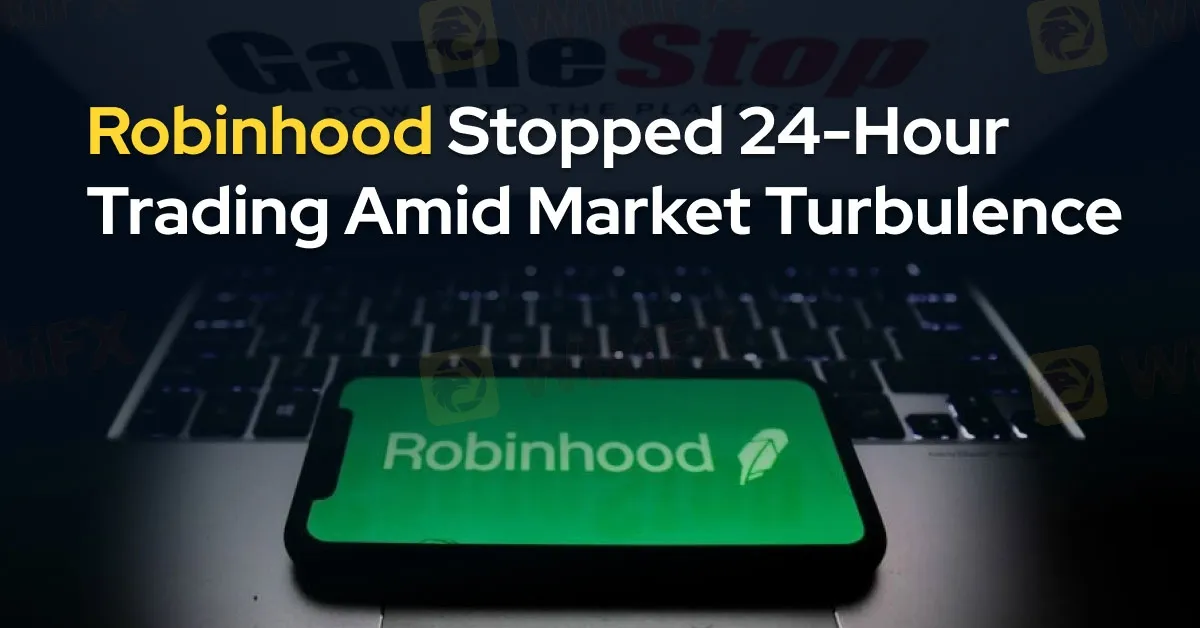简体中文
繁體中文
English
Pусский
日本語
ภาษาไทย
Tiếng Việt
Bahasa Indonesia
Español
हिन्दी
Filippiiniläinen
Français
Deutsch
Português
Türkçe
한국어
العربية
Robinhood Stopped 24-Hour Trading Amid Market Turbulence
Abstract:Robinhood announced the suspension of its 24-hour overnight trading service due to the severe market downturn on Monday, August 5.

Robinhood (NASDAQ:HOOD), a leading US neobroker, has announced the suspension of its 24-hour overnight trading service due to the severe market downturn on Monday, August 5. This service will be unavailable through Tuesday, August 6.
The market faced a steep decline on Monday, with the Dow Jones Industrial Average plummeting more than 1,000 points, a 2.6% drop. The broader S&P 500 and technology-heavy NASDAQ indices saw even sharper declines of 3.0% and 3.4%, respectively. Cryptocurrencies also took a hit, with Bitcoin and Ether prices dropping significantly.
In a statement on X (formerly Twitter), Robinhood explained that its overnight trading platform, Blue Ocean ATS (BOATs), would be offline for the night. Orders placed before approximately 8 PM ET will resume processing around 4 AM ET the following morning. Users can cancel their orders anytime and place new ones for the next trading session.

The market turmoil extended to Japan, where stocks experienced a dramatic 13% drop, the largest since the 2011 global financial crisis. This sharp sell-off led to circuit breakers being triggered across Asian exchanges. The Asia-Pacific index, excluding Japan, fell by 4.2%, while Japan's Nikkei 225 index hit a seven-month low.
In the United States, the negative trend continued with Nasdaq futures down 4.7% and S&P 500 futures plunging 12.4%. European markets were also affected, with EUROSTOXX 50 futures falling 2.1% and FTSE futures dropping 1.2%.
Investors turned to safer assets, causing both the yen and Swiss franc to strengthen. Japanese 10-year bond yields fell to 0.785%, the lowest since April, and U.S. Treasury yields also dropped significantly, with 10-year yields at 3.723% and two-year yields at 3.807%. This inversion of the yield curve is often seen as a recession indicator.
Following a disappointing July payrolls report, market expectations for Federal Reserve rate cuts have surged. Analysts now predict a 78% chance of a rate cut in September, with further reductions expected later in the year. Goldman Sachs has raised its recession probability to 25% under current conditions.
The U.S. dollar's appeal as a safe haven weakened, falling 0.4% against a basket of major currencies. It also declined against the yen and euro, while the Swiss franc appreciated. Gold prices climbed to $2,456 an ounce as investors sought refuge in precious metals.

Disclaimer:
The views in this article only represent the author's personal views, and do not constitute investment advice on this platform. This platform does not guarantee the accuracy, completeness and timeliness of the information in the article, and will not be liable for any loss caused by the use of or reliance on the information in the article.
Read more

Hong Kong Warns of CBEX Group Fraud Amid Nigerian Outrage
Hong Kong's 2024 alert revealed CBEX Group's fraudulent activities, misleading investors in Nigeria and beyond. Many face significant financial losses and withdrawal issues.

Kraken Brings Commission-Free Stock Trading to the U.S.
Kraken launches commission-free trading for thousands of U.S.-listed stocks and ETFs, marking its first major expansion beyond crypto into traditional markets.

PU Prime Teams Up with AFA to Champion Excellence in Football and Trading
PU Prime partners with Argentina’s national football team, AFA, to promote forex trading, financial education, and global brand expansion in key markets.

Norfolk Police Warn About Investment Scams: Losses Total $143K
Norfolk OPP urges caution after two residents lost $143K in online trading and crypto scams. Protect yourself from investment fraud.
WikiFX Broker
Latest News
Singapore Authorities Warn Public of OneMotoring Phishing Scam, $407K Lost
4 Firms Named by FCA for Operating Without Authorisation or Impersonating Licensed Companies
False Promises, Real Losses: The Dark Reality of Online Trading Scams
Eightcap Launches Dedicated YouTube Channel for Italian Traders
Are We in a Retracement Or the Start of a Financial Collapse?
Why Forex Traders Should Prioritize VPS for Stability
Colmex Pro Settles with CySEC for €200,000 Over Compliance Issues
US March Inflation Data Released: A Mixed Bag
CySEC Issues Investor Alert on Unauthorized Financial Websites
US Forex Brokers Hold Over $500 Million in Client Funds
Currency Calculator


